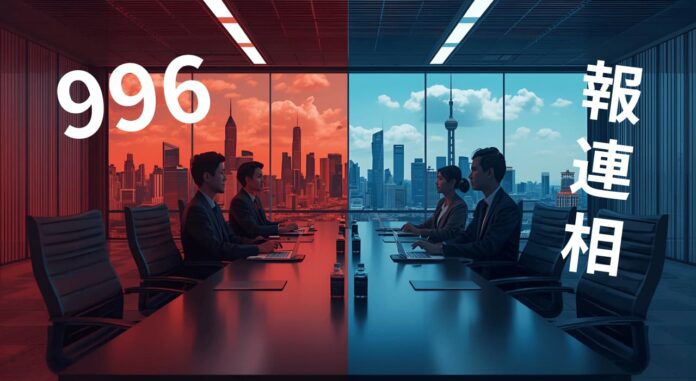I. Introduction: Your First Step to Success in Japan
You are a talented engineer, and you are looking to take your career to the next level in Japan. While the technology is world-class, the corporate culture and work style are significantly different from what you may be used to in China.
Success in the Japanese market isn’t just about technical skills; it’s about understanding and adapting to a new environment. This guide will give you an honest comparison between Chinese and Japanese IT companies, focusing on the key cultural differences that will impact your daily work.
II. Prerequisite: The Chinese IT Culture You Know
To set the stage, let’s quickly review the environment you are likely familiar with—one defined by blazing speed and intense competition:
- The 996 Culture: Working from 9 AM to 9 PM, 6 days a week has long been the norm in many large Chinese tech companies, and although officially restricted, it often continues as an implicit expectation in high-pressure roles.
- Strong Meritocracy: Performance is king. Rapid promotion and major salary jumps are expected and often achieved through demonstrable results and frequent job hopping.
III. Culture Comparison: Organization and Communication
A. Organizational Structure and Decision Speed
The difference in hierarchy fundamentally changes how work flows.
B. The Communication Style: Mastering “Hōrensō”
The biggest cultural hurdle is often communication style.
- The “Hōrensō” Mandate: In Japan, Hōrensō (Hōkoku: Report, Renraku: Inform, Sōdan: Consult) is non-negotiable. Unlike China, where results often speak louder than the process, Japanese managers expect frequent updates on the process and proactive consultation before problems become crises. Never wait until the deadline to report an issue.
- Dealing with Ambiguity: Japanese colleagues often avoid direct confrontation or saying “No” outright. Phrases like “I’ll look into it” or “It might be difficult” often mean “No” or “Be careful.” You must learn to read the implicit meaning and always confirm specific details to avoid misunderstanding.
IV. Work Style and Evaluation: Career and Compensation
A. Working Hours and Work-Life Balance
You will find a very different approach to labor in Japan.
B. Evaluation and Career Path
- Evaluation System: While China is overwhelmingly meritocratic, Japan features a mix. Traditional companies still lean towards seniority, but modern startups and global firms are increasingly performance-based.
- Career Trajectory:
- China: Quick ascent via job hopping is normal and encouraged.
- Japan: The traditional path favors long-term employment and stability. Employees often become “generalists” who gain broad experience through internal rotations. While “specialist” roles are growing, loyalty is still highly valued.
- Salary and Benefits: While top Chinese companies may offer competitive (or sometimes higher) starting salaries, Japan offers robust job security, comprehensive benefits, and predictable annual increases in most large firms.
V. Three Rules for Success in Japanese IT Companies
Mastering these points is crucial for a smooth transition and long-term success:
- Rule 1: Cultivate Clarifying Question Skills. Never accept ambiguous instructions like “Do it properly” or “Figure it out.” Always confirm the deadline, the definition of ‘done’, and the priority level with your manager. You are expected to ask questions until the requirement is clear.
- Rule 2: Master the Art of Proactive Reporting. Don’t wait until a failure is certain. If you hit a roadblock or realize a deadline will be missed, immediately consult (Sōdan) your team. Report the status, the issue, and your plan for the next steps. Never let a surprise failure happen.
- Rule 3: Focus on Respect, Not Just Formalities. While Keigo (honorific speech) can be intimidating, the most important thing is showing respect and courtesy to your seniors and colleagues. Use simple polite language (ending sentences with desu or masu) and learn the essential business manners like exchanging business cards.
VI. Conclusion: Making Your Smart Career Choice
Remember the core difference: China favors rapid growth and individual results; Japan favors stability, long-term contribution, and team harmony.
- Japan is a great fit if you value a stable environment, clear labor rules, guaranteed benefits, and working as part of a highly cohesive team.
- China is often better if high risk/high reward and rapid individual ascent are your primary goals.
Make your choice wisely. Start by researching the culture of the specific Japanese companies you target—are they traditional, or modern startups? This will be the most important factor in finding the right match for your career!
For more articles👇👇👇
📩 Subscribe to the Newsletter














